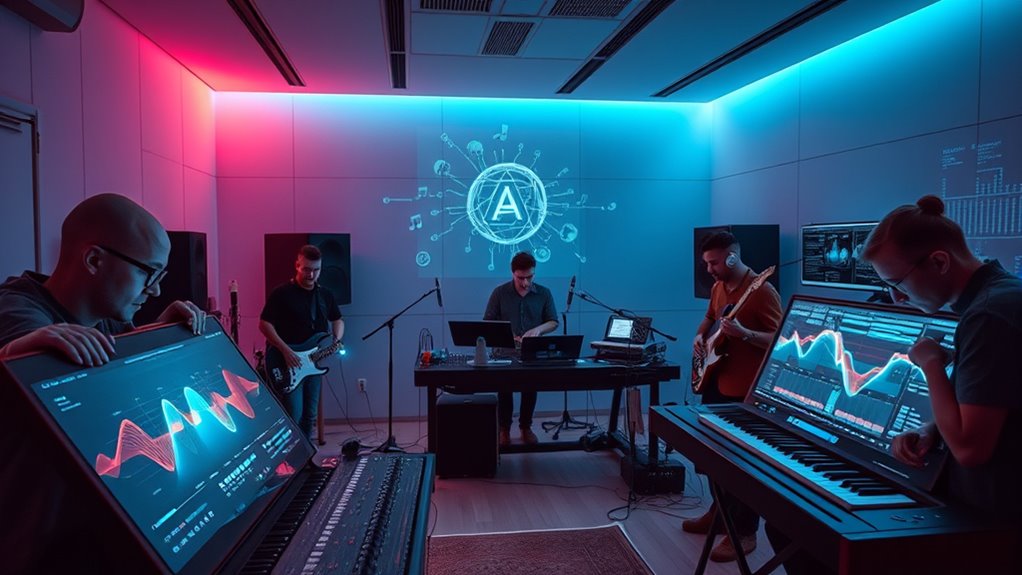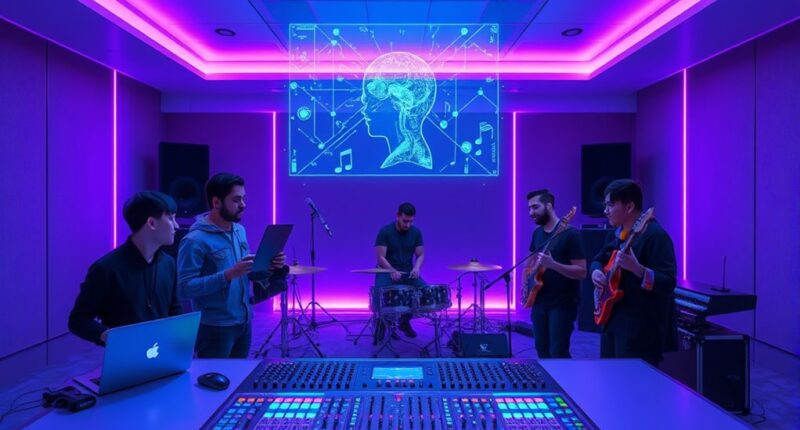AI collaboration is revolutionizing music creation, blending your creativity with machine innovation to access new sounds and genres. It allows you to experiment rapidly, generate fresh ideas, and push musical boundaries. However, it also raises questions about originality, ownership, and ethics that you need to take into account. As technology evolves, balancing artistic integrity with responsible use becomes essential. If you continue exploring, you’ll discover how AI is shaping the future of musical innovation and your role in it.
Key Takeaways
- AI tools enable innovative genre blending and sound experimentation, expanding musical possibilities and pushing creative boundaries.
- Ethical considerations, including authorship, ownership, and transparency, are crucial in AI-assisted music collaboration.
- AI can disrupt traditional careers but also offers new opportunities for artists to enhance their creativity responsibly.
- Maintaining artistic integrity and authenticity is vital when integrating AI into music production processes.
- Responsible AI use fosters a future where technological innovation and ethical values coexist, ensuring meaningful musical development.

Artificial intelligence is transforming the way musicians create and collaborate, opening new possibilities for innovation and expression. As you explore AI-driven tools, you’ll notice how they push the boundaries of music genre innovation, enabling you to blend styles, experiment with sounds, and craft entirely new musical landscapes. AI can analyze vast datasets of existing music, helping you discover unique combinations or generate fresh ideas that might have taken much longer to conceive manually. This fusion of genres opens up exciting avenues for creativity, allowing you to craft sounds that are entirely your own or even redefine traditional styles. However, as you embrace these innovations, you need to consider the ethical considerations involved in AI music collaboration. Questions about originality, authorship, and the role of human creativity become central as AI becomes more embedded in your process. It is crucial to reflect on whether AI-generated content truly belongs to you or if it’s a shared creation, and how much influence you should exert over the machine’s output. Respect for intellectual property rights and transparency about AI’s involvement are essential to maintain integrity in your work. Furthermore, you should think about the potential for AI to reinforce biases present in the training data, which could unintentionally shape or skew your music in ways you might not anticipate. Ethical considerations also extend to the impact on other artists—consider how AI might disrupt traditional music careers or influence the value of human musicianship. As you integrate AI into your creative process, you’re tasked with balancing the technological advantages with responsible use. It’s important to stay informed about the evolving legal landscape surrounding AI-generated music and to advocate for fair practices that recognize human contributions. While these tools can foster innovation and help you push musical boundaries, they also demand a mindful approach to ensure your work remains authentic and ethically sound. Additionally, understanding Gold IRA options can offer valuable insights into secure investment practices that may support your creative pursuits financially. Ultimately, AI is a powerful partner in your musical journey, capable of inspiring new ideas and expanding your creative horizons, but it also requires your active awareness and responsible engagement. By understanding the implications of using AI, you can harness its potential to drive music genre innovation while maintaining the integrity and ethics that underpin meaningful artistic expression. Embracing AI in music collaboration means more than just adopting new technology; it’s about shaping a future where creativity thrives alongside ethical responsibility, ensuring your music not only sounds innovative but also respects the values that make art truly impactful.
Frequently Asked Questions
How Does AI Influence Traditional Music Composition Methods?
AI influences traditional music composition by enhancing your understanding of music theory and improvisation techniques. It provides real-time suggestions, helping you experiment with harmonies and melodies you might not have considered. You can quickly develop ideas, refine your work, and explore new styles. AI acts as a creative partner, empowering you to push boundaries and deepen your musical knowledge, ultimately transforming your approach to composing and improvising.
Can AI Replicate Unique Human Emotional Expressions in Music?
Yes, AI can mimic human emotional expressions in music. For example, an AI system trained on heartfelt jazz solos might generate pieces that evoke emotional authenticity, capturing subtle nuances. While AI can produce creative spontaneity, it struggles with genuine emotional depth, because it lacks true consciousness. So, you might find AI-created music emotionally compelling, but it often misses the true emotional authenticity that human musicians bring to their art.
What Are the Legal Implications of Ai-Generated Music?
You need to contemplate that AI-generated music raises legal issues surrounding intellectual property and licensing rights. You might face challenges in claiming ownership or protecting rights since AI tools often use existing works without clear licensing. It’s essential to understand who holds the rights—the creator or the AI developer—and guarantee proper licensing agreements. This way, you can avoid legal disputes and properly monetize your AI-assisted musical creations.
How Accessible Is AI Music Collaboration for Amateur Musicians?
AI music collaboration is like opening a door to a new universe, and it’s more accessible than you might think. Thanks to user-friendly platforms, you don’t need advanced technical skills to get started. While some technological barriers exist, many tools are designed for amateurs, making it easier to create and experiment. With a little curiosity, you can jump into AI-assisted music making without feeling overwhelmed, revealing endless creative possibilities.
Will AI Replace Human Musicians in the Future?
AI won’t replace human musicians entirely, but it will transform creative collaboration. As you work with AI, consider AI ethics to guarantee your music remains authentic and meaningful. Instead of seeing AI as a replacement, view it as a tool that enhances your creativity. You’ll find that AI helps you explore new sounds and ideas, allowing you to push boundaries while maintaining the human touch that makes music special.
Conclusion
As you explore AI music collaboration, remember it’s not about replacing your unique voice but gently expanding your creative horizon. Embrace these tools as subtle partners that whisper new ideas and inspire fresh melodies. Together, you and AI can craft harmonious masterpieces that might have remained just out of reach. In this evolving dance of innovation, the true magic lies in your willingness to let technology softly guide your artistic journey into uncharted, beautifully uncertain waters.










